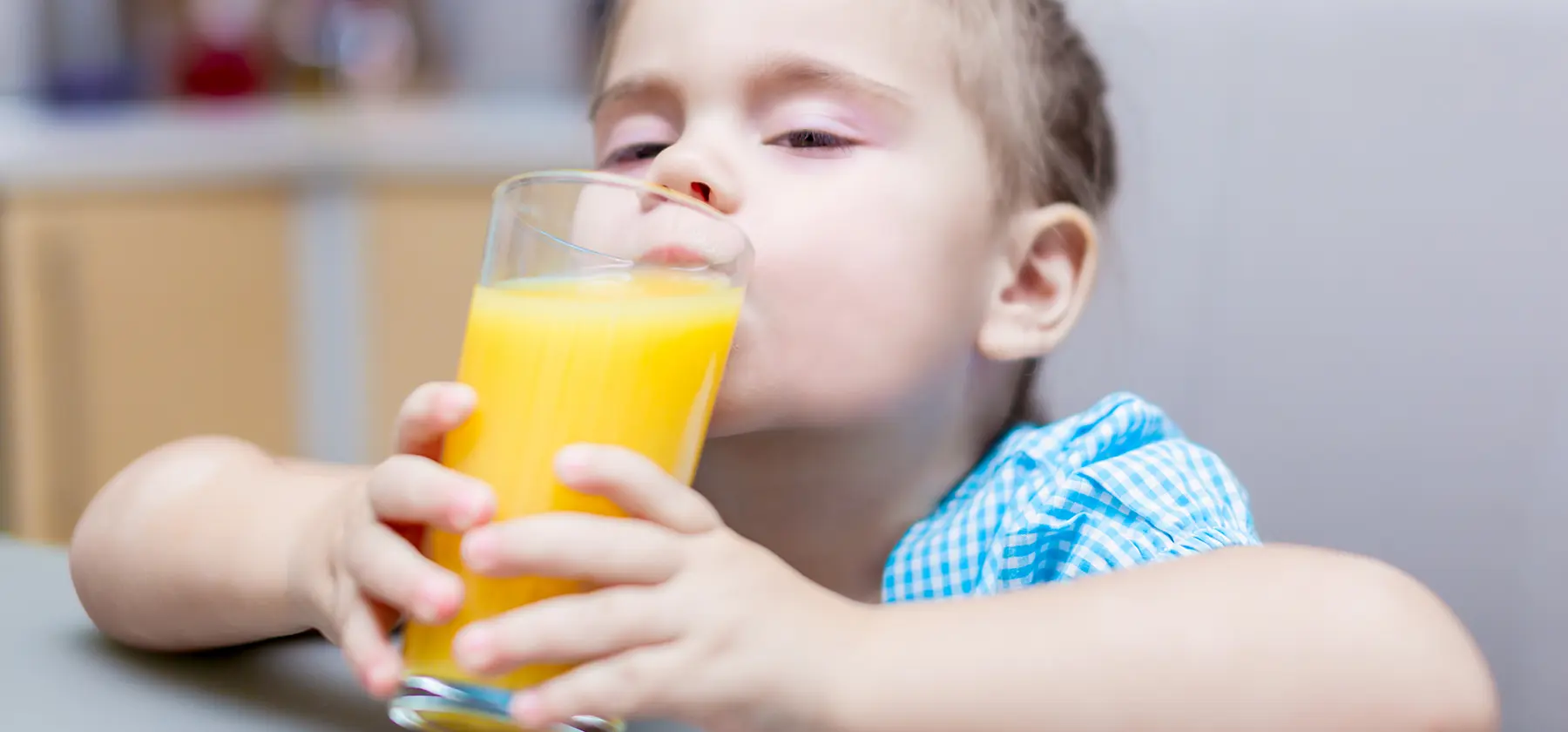
Is Juice Ruining Your Child’s Teeth? What Parents Should Know
Reviewed by Dr. David Sentelle, DMD, PhD, MPH
Reading time: four minutes.
Juice may seem like a healthy choice, but even 100% fruit juice can quietly damage your child’s teeth. While many parents view juice as a natural part of a balanced diet, its sugar and acid content can lead to early tooth decay—especially in baby teeth.
In this blog, we explain how juice affects dental health, how much is too much, which juices are the most harmful, and what to serve instead. You will also find simple, practical tips to protect your child’s teeth without eliminating every sweet drink.
Table of Contents
Key Takeaway
Juice may seem harmless, but its sugar and acid content can damage your child’s teeth, especially with frequent sipping. Limit juice to mealtimes, encourage water in between, and stick to regular brushing and dental checkups to keep their smile healthy.
How Juice Affects Children’s Teeth
Even 100% fruit juice can increase the risk of tooth decay in young children. Juice contains natural sugars and acids that wear down enamel. Once enamel weakens, teeth are more vulnerable to bacteria and cavities. Because children’s enamel is thinner than adult enamel, juice affects them faster and more severely.
Why juice is bad for kids’ teeth:
- High sugar content: Fuels cavity-causing bacteria in the mouth.
- Acidic pH: Weakens tooth enamel and makes teeth more porous.
- Frequent sipping: Exposes teeth to sugar and acid over long periods.
- Sticky texture: Some juices cling to teeth and feed harmful bacteria.
This combination makes juice one of the top culprits in early childhood caries, especially when given in a bottle or sippy cup.
Learn More About Toddler Tooth Decay
How Much Juice Is Too Much?
The American Academy of Pediatrics recommends strict limits on juice for kids.
Age-based juice limits:
- Under 1 year: No juice at all.
- 1 to 3 years: No more than 4 ounces per day.
- 4 to 6 years: Max 4–6 ounces per day.
- 7 and older: Limit to 8 ounces daily.
Even if juice is diluted, the sugars and acids still affect your child’s teeth. The longer it takes them to drink it, the more damage is done. Juice given at bedtime or in bottles is especially harmful.
Which Juices Are Worst for Enamel?
All juices have natural sugar, but some are more acidic than others.
Juices that cause the most enamel damage:
- Citrus juices (orange, lemon, grapefruit)
- Apple juice
- Grape juice
- Juice blends or “fruit cocktails”
Even “no sugar added” juices can damage teeth due to their natural fruit acids.
Better Alternatives to Keep Teeth Healthy
Water should always be the go-to drink, especially between meals.
To protect your child’s teeth:
- Stick to milk or water: Especially at night or nap time.
- Serve juice only at meals: Never in a bottle or sippy cup.
- Dilute with water: If juice is served, cut it at least 50/50 with water.
- Use an open cup: Reduces constant sipping and pooling around teeth.
- Offer whole fruit instead: Provides fiber and less concentrated sugar.
Rinsing with water after juice is a simple way to protect their teeth until it’s time to brush.
What We Offer at Lonestar Kid’s Dentistry
We provide preventive care and parent education that supports healthy habits from the start.
At our McKinney office, our services include:
- Dental exams and cleanings
- Fluoride treatments
- Sealants
- Cavity prevention counseling
- Nutritional guidance
Schedule a Preventive Dental Visit in McKinney
Juice may seem like a simple treat, but without limits, it can quietly erode your child’s enamel and set the stage for early cavities. The good news? With a few smart changes and routine dental care, you can keep their smile strong, healthy, and cavity-free.
At Lonestar Kid’s Dentistry in McKinney, we help families understand how nutrition, habits, and preventive treatments work together to protect growing teeth. From diet tips to fluoride care, we are here to guide you every step of the way.
Schedule a dental exam at our pediatric dental office in McKinney, TX, call (214) 436-5555 or visit us at 5323 W University Dr #100, McKinney, Texas.
📍Other locations
Lonestar Kid’s Dentistry in Frisco, TX
Lonestar Kid’s Dentistry in Prosper, TX
FAQs
Organic juice may come from better farming practices, but it still contains natural sugars and fruit acids. These sugars feed cavity-causing bacteria and the acids weaken enamel, which leads to decay over time.
Diluting juice reduces sugar and acid concentration, but it does not eliminate risk. Serve it only with meals, and use a straw or open cup to reduce contact with teeth.
Smoothies have fiber, which helps slow sugar absorption, but they still contain concentrated sugar and acid. Many store-bought smoothies include added sweeteners or acidic yogurt. Offer smoothies occasionally and have your child rinse or brush afterward.
Brushing is important, but it cannot fully protect against the effects of juice. The sugars and acids in juice start working on teeth immediately, especially if your child sips slowly or drinks it often. To protect their enamel, it is best to limit juice, serve it with meals, and have them rinse with water afterward. Brushing with fluoride toothpaste should still be part of their daily routine, but it works best when combined with healthy habits.
When kids sip juice slowly over time, their teeth stay exposed to sugar and acid for much longer. This repeated exposure increases the risk of enamel erosion and cavities. Serving juice with meals and encouraging your child to finish it in one sitting reduces how long those harmful substances stay on their teeth.
